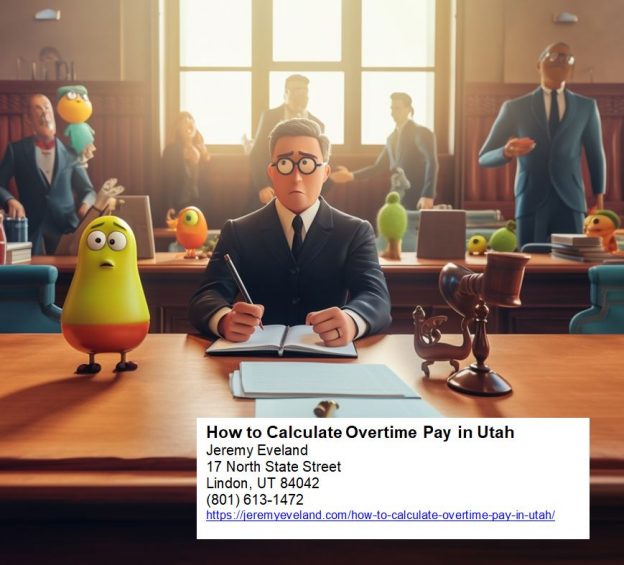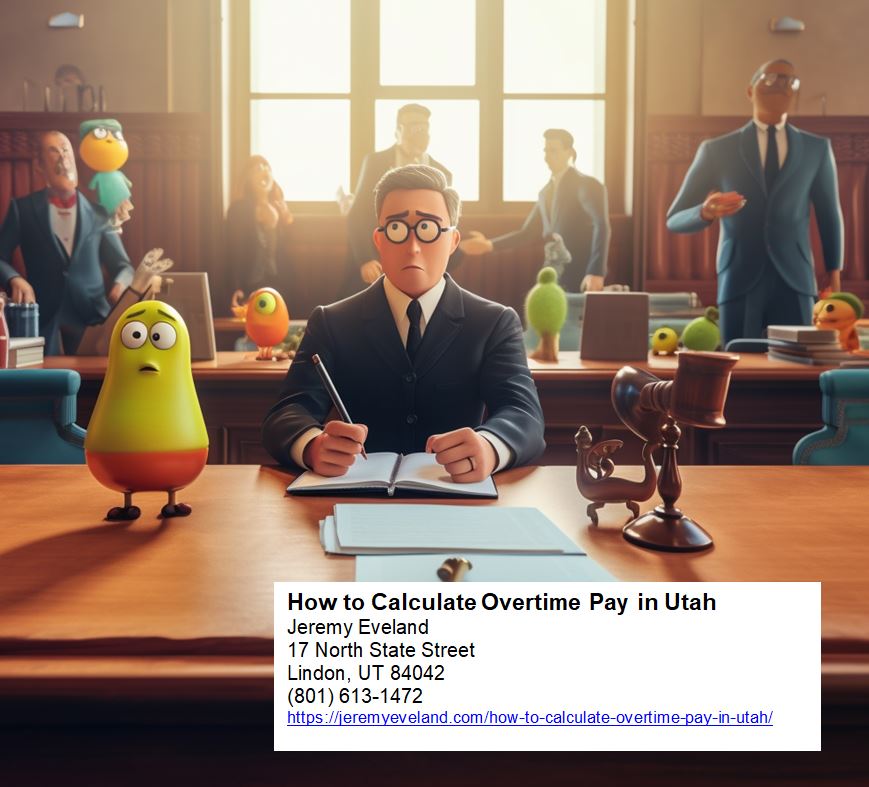Are you a business owner in Utah seeking to establish a strong foundation for your employees? Understanding the importance of a well-crafted employment contract is crucial in ensuring a harmonious working relationship with your staff. By outlining the rights and responsibilities of both parties, an employment contract acts as a safeguard, protecting the interests of both the employer and the employee. In this article, we will discuss the key elements that make up a solid employment contract in Utah, allowing you to navigate the intricacies of employment law with confidence and providing you with the tools necessary to cultivate a cohesive work environment. With a comprehensive understanding of this topic, you can proactively protect your business and foster a productive workforce.

1. Understanding the Basics of Employment Contracts
1.1 What is an employment contract?
An employment contract is a legal agreement between an employer and an employee that outlines the terms and conditions of their professional relationship. It sets out the rights and obligations of both parties and provides a framework for the employment arrangement. The contract may include details such as job responsibilities, compensation, benefits, working hours, and termination procedures.
1.2 Why is an employment contract important?
An employment contract is important for both employers and employees as it establishes clear expectations and protects the rights of both parties. For the employer, an employment contract ensures that the employee understands their role, responsibilities, and the company’s policies. It helps protect the employer’s intellectual property, confidential information, and trade secrets. For the employee, the contract provides job security, outlines compensation and benefits, and establishes a clear process for termination or resignation.
1.3 Key elements of an employment contract
An employment contract typically includes several key elements. First, it identifies the parties involved, clearly stating the names and addresses of both the employer and the employee. It also specifies the duration of the employment, whether it is for a fixed term or an indefinite period.
The contract outlines the terms of employment, including job title, job description, and reporting structure. It also includes details about working hours, breaks, and any additional requirements specific to the role.
Compensation and benefits are crucial components of an employment contract. It details the salary or hourly rate, payment frequency, and any additional financial incentives. The contract may also cover benefits such as health insurance, retirement plans, and vacation allowances.
Furthermore, employment contracts often incorporate non-compete and non-disclosure clauses to protect the employer’s interests after the termination of the employment. They may also address intellectual property rights, ensuring that any work created by the employee during their employment belongs to the employer.
Lastly, an employment contract includes termination and severance provisions. It outlines the conditions under which the contract can be terminated, whether it be by the employer or the employee. It also specifies notice periods and severance packages in cases of termination.
2. Identifying the Applicable Laws in Utah
2.1 Employment laws in Utah
Understanding the applicable employment laws in your state is essential when creating an employment contract. In Utah, several laws govern the employer-employee relationship. The Utah Antidiscrimination Act prohibits employment discrimination based on race, color, religion, sex, pregnancy, national origin, age, disability, or genetic information. Employers must comply with these laws and ensure that their employment contracts align with the provisions outlined in the Act.
Additionally, the Utah Payment of Wages Act requires employers to pay their employees in a timely manner and specifies the circumstances under which deductions can be made from employees’ wages.
2.2 Understanding the Utah Labor Code
The Utah Labor Code is another crucial set of laws to consider when drafting an employment contract in Utah. It covers areas such as minimum wage requirements, overtime pay, safe working conditions, and maximum working hours. These laws protect employees’ rights and must be adhered to by employers in the state.
2.3 Other relevant laws and regulations
In addition to the Utah Antidiscrimination Act and the Utah Labor Code, employers should also be aware of other relevant laws and regulations that may impact employment contracts. These may include the Family and Medical Leave Act (FMLA), the Fair Labor Standards Act (FLSA), and the Americans with Disabilities Act (ADA), among others. By understanding these laws, employers can ensure that their employment contracts are comprehensive and meet legal requirements.
3. Drafting and Customizing the Employment Contract
3.1 Consultation with an employment lawyer
When drafting an employment contract, it is advisable to consult with an experienced employment lawyer. They have in-depth knowledge of employment laws and can help ensure that the contract is legally sound and protects both parties’ interests. An employment lawyer can provide guidance on applicable state and federal laws, assist in customizing the contract to suit specific needs, and help address any potential legal risks.
3.2 Identifying the parties involved
The employment contract should clearly identify the parties involved in the agreement. This includes the full legal names, addresses, and contact information of both the employer and the employee. Accurately identifying the parties prevents any ambiguity and ensures that the contract is legally binding.
3.3 Stating the terms of employment
The terms of employment section of the contract should outline the details of the job, including the job title, job description, and reporting structure. It should clearly define the nature of the employment, whether it is full-time, part-time, or temporary. This section may also include information about probationary periods, if applicable.
3.4 Specifying the job duties and responsibilities
Clearly outlining the job duties and responsibilities is crucial to avoid misunderstandings and disputes in the future. This section should include a comprehensive description of the tasks and expectations associated with the role. It helps ensure that the employee understands their responsibilities and enables the employer to hold the employee accountable for their performance.
3.5 Defining the compensation and benefits
The compensation and benefits section of the contract is a critical component that outlines the financial aspects of the employment. It should include details about the employee’s salary or hourly rate, payment frequency, and any additional financial incentives or bonuses. The contract should also specify benefits such as health insurance, retirement plans, and vacation allowances.
3.6 Inclusion of non-compete and non-disclosure clauses
Employers often include non-compete and non-disclosure clauses in employment contracts to protect their business interests. These clauses prohibit employees from competing with the employer’s business during or after their employment and safeguard confidential information and trade secrets. Non-compete and non-disclosure clauses should be carefully tailored to comply with Utah laws and to ensure their reasonableness and enforceability.
3.7 Addressing intellectual property rights
To protect the employer’s intellectual property, the employment contract should address ownership and rights to any work created by the employee during their employment. This section should specify that any intellectual property or inventions developed as part of the employee’s role belong to the employer. Ensuring clarity in this regard is crucial to avoid disputes over ownership and rights.
3.8 Incorporating termination and severance provisions
Termination and severance provisions are essential components of an employment contract. They outline the conditions under which the contract can be terminated, whether it is by the employer or the employee. The contract should specify notice periods required for termination, as well as any severance packages provided in cases of termination. Including these provisions helps establish a fair and clear process for ending the employment relationship.
3.9 Compliance with state and federal requirements
When drafting an employment contract, it is vital to ensure compliance with both state and federal requirements. The contract must adhere to the applicable laws and regulations, such as the Utah Antidiscrimination Act, the Utah Labor Code, and federal laws like the FMLA and FLSA. Working with an employment lawyer can help ensure that the contract meets all legal requirements and protects the rights of both parties involved.
4. Seek Legal Review and Revision
4.1 The importance of legal review
Before finalizing the employment contract, it is crucial to seek legal review and revision. This step ensures that the contract complies with all relevant laws and regulations and adequately protects the rights and interests of both parties. Legal review helps identify any potential issues, gaps, or inconsistencies that need to be addressed before the contract is executed.
4.2 Consulting an employment attorney
Consulting an employment attorney during the review process is highly recommended. They can provide expertise in employment law, ensure that the contract is enforceable and fair, and help navigate any particular legal considerations. An employment attorney can also assist in resolving complex contractual issues and negotiate terms on behalf of their client.
4.3 Reviewing and revising the contract
During the legal review, the employment attorney will carefully examine the contract for compliance with the applicable laws and regulations. They will also review the document for clarity, accuracy, and completeness. If any issues or areas of concern are identified, the attorney will work with the employer to revise and refine the contract, ensuring that it meets legal standards and protects the interests of their client.
5. Executing and Enforcing the Employment Contract
5.1 Signing and executing the contract
Once the employment contract has been reviewed and revised, it is ready for execution. Both the employer and the employee should sign the contract, indicating their agreement to the terms and conditions outlined within. This step solidifies the legal validity of the contract and initiates the employment relationship.
5.2 Distributing copies to all parties involved
After the contract has been executed, it is important to distribute copies of the signed contract to all parties involved, including the employer, employee, and any necessary stakeholders. Each party should keep a copy of the contract for their records, as it serves as a reference and legally binding agreement throughout the employment term.
5.3 Monitoring compliance
Throughout the employment relationship, employers should carefully monitor compliance with the terms and conditions outlined in the employment contract. This includes ensuring that both parties are meeting their obligations, such as adhering to working hours, fulfilling job responsibilities, and following company policies. Regular performance reviews and open communication can help address any issues or concerns in a timely manner.
5.4 Enforcing the contract provisions
In the event of any breach of the contract provisions, employers must take appropriate action to enforce the terms. This may involve discussing the issue with the employee, providing warnings or performance improvement plans, or, in extreme cases, termination of employment. Enforcing the contract provisions helps maintain a productive and fair work environment and protects the employer’s rights.
5.5 Addressing disputes and conflicts
In the case of disputes or conflicts related to the employment contract, it is important to address them promptly and professionally. Open communication and mediation can often help resolve issues amicably. However, if resolution cannot be reached, employers and employees may need to seek legal assistance to protect their rights and interests. Consulting an employment attorney experienced in dispute resolution can provide valuable guidance in navigating such situations.
6. Updating and Modifying the Employment Contract
6.1 Circumstances requiring contract updates
There may be circumstances that require updates or modifications to the employment contract throughout the course of employment. These circumstances can include changes in job responsibilities, salary adjustments, changes in benefits, or updates to the company policies. It is important to ensure that the contract accurately reflects the current terms and conditions of employment.
6.2 Legal requirements for modifying the contract
When making modifications to an employment contract, it is crucial to follow legal requirements to maintain the contract’s validity. Changes should be made in writing and duly signed by both parties. It is advisable to consult with an employment attorney to ensure that the modifications comply with relevant laws and regulations and are appropriately documented.
6.3 Communicating changes to employees
When modifications are made to an employment contract, it is important to effectively communicate the changes to the affected employees. This can be done through written communication, such as a letter or email, clearly outlining the modifications and their effective date. Providing employees with an opportunity to ask questions or seek clarification can help ensure a smooth transition.
6.4 Documenting contract modifications
It is essential to maintain a record of any modifications made to an employment contract. This includes keeping copies of the original contract, as well as all amendments or addendums. Employers should ensure that both parties involved receive copies of the modified contract and that the changes are appropriately documented and stored for future reference.

7. Retaining and Safeguarding Employment Contracts
7.1 Importance of maintaining proper records
Retaining employment contracts is important for several reasons. It ensures that both employers and employees have a record of the terms and conditions agreed upon at the start of the employment relationship. Proper record-keeping also protects both parties in the event of any disputes or legal issues that may arise in the future. Employment contracts serve as evidence and references for the obligations and rights of each party.
7.2 Organizing and storing employment contracts
Employers should establish an organized system for storing and managing employment contracts. Contracts should be kept confidential and securely stored, either electronically or in hard copy form. It is important to have easy access to these records in case they need to be referred to or updated during the course of the employment.
7.3 Protecting sensitive information
Employment contracts often contain sensitive information, such as social security numbers, addresses, and financial details. Employers should take appropriate measures to protect this information from unauthorized access and ensure compliance with privacy regulations. Implementing secure data storage systems and limiting access to authorized personnel can help safeguard sensitive information and reduce the risk of privacy breaches.
8. Seeking Legal Assistance for Disputes or Violations
8.1 Common employment contract disputes
Despite the best efforts to create a solid employment contract, disputes can still arise. Common disputes related to employment contracts include issues such as breach of contract, non-payment of wages, disagreements over job responsibilities, or failure to comply with non-compete clauses. When faced with such disputes, it is important to seek legal assistance to protect your rights and effectively resolve the issue.
8.2 Steps to take in case of contract violations
In the event of a contract violation, it is important to take appropriate steps to address the issue. Start by reviewing the contract terms to determine if a violation has occurred. If a violation is identified, communicate with the other party involved to attempt to resolve the issue amicably. If resolution cannot be reached, consult with an employment attorney who can guide you through the legal process and assist in seeking appropriate remedies.
8.3 Hiring an attorney for legal representation
When facing employment contract disputes or violations, hiring an employment attorney is advisable. An employment attorney specialized in employment law can provide expert advice, represent your interests, and ensure that your rights are protected. They can assist in negotiating settlements, filing lawsuits if necessary, and provide effective legal representation throughout the legal proceedings.

9. Frequently Asked Questions
9.1 What should be included in an employment contract in Utah?
An employment contract in Utah should include key elements such as the names and addresses of the parties, the duration of employment, job responsibilities, compensation and benefits, non-compete and non-disclosure clauses if applicable, intellectual property rights, termination and severance provisions, and compliance with state and federal requirements.
9.2 Can an employment contract override state laws in Utah?
An employment contract cannot override state laws in Utah. While the contract can include specific terms and conditions, it must still comply with applicable state and federal laws. If any provisions in the contract conflict with the law, the law will prevail.
9.3 What are the consequences of not having a written employment contract?
Not having a written employment contract can lead to ambiguity, disputes, and potential legal issues. Without a written agreement, both the employer and the employee may have limited protection of their rights. It is advisable to have a written employment contract to establish clear expectations and provide a legal framework for the employment relationship.
9.4 Can an employment contract be modified during the course of employment?
Yes, an employment contract can be modified during the course of employment. However, any modifications should be made in writing, duly signed by both parties, and comply with legal requirements. Consulting with an employment attorney is recommended to ensure that the modifications are legally valid and enforceable.
9.5 How can an employment attorney help in drafting and enforcing an employment contract?
An employment attorney can provide valuable assistance in drafting and enforcing an employment contract. They have in-depth knowledge of employment laws and can ensure that the contract meets legal requirements. An employment attorney can also help protect the rights and interests of both parties, navigate any potential legal issues, and provide representation in case of disputes or violations.





















